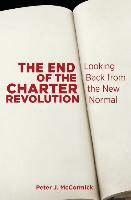Partager
Fr. 89.00
Peter McCormick, Peter J. Mccormick, Peter J. McCormick
End of the Charter Revolution - Looking Back From the New Normal
Anglais · Livre Relié
Expédition généralement dans un délai de 1 à 3 semaines (ne peut pas être livré de suite)
Description
The Canadian Charter of Rights and Freedoms became an entrenched part of the Canadian Constitution on April 17, 1982. The Charter represented a significant change in Canadian constitutional order and carried the courts, and the Supreme Court in particular, decisively into some of the biggest controversies in Canadian politics. Although the impact of the Charter on Canadian law and society was profound, a new status quo has been established. Even though there will be future Charter surprises and decisions that will claim news headlines, Peter J. McCormick argues that these cases will be occasional rather than frequent, and that the Charter "revolution" is over. Or, as he puts it in his introduction, "I will tell a story about the Charter, about the big ripples that have gradually but steadily died away such that the surface of the pond is now almost smooth."
The End of the Charter Revolution explores the Canadian Charter of Rights and Freedoms, beginning with a general historical background, followed by a survey of the significant changes brought about as Charter decisions were made. The book addresses a series of specific cases made before the Dickson, Lamer, and McLachlin Courts, and then provides empirical data to support the argument that the Charter revolution has ended. The Supreme Court has without question become "a national institution of the first order," but even though the Charter is a large part of why this has happened, it is not Charter decisions that will showcase the exercise of this power in the future.
Table des matières
List of Illustrations Acknowledgements Introduction 1. Towards the Charter False Dawn: The Supreme Court in the 1950s False Start: The Bill of Rights The Bill of Rights as Fumbled Opportunity Preparing the Revolution: Transforming the Court Accomplishing the Revolution: Entrenching the Charter 2. Interpreting the Charter Modes of Constitutional Interpretation Interpreting the Bills of Rights Conclusion: Interpreting Constitutions, Interpreting Rights 3. The Dickson Court: The Charter Framed The Dickson Court and the Charter: The "First Five" Following Up The Blockbuster: Morgentaler The Odd One Out: The Labour Trilogy Conclusion 4. The Lamer Court: The Charter Expanded The Lamer Court and Gay Rights The Lamer Court and Equality Rights The Lamer Court and Free Speech or Obscenity The Lamer Court and Judicial Independence The Lamer Court and Charter Remedies: The Expanding Repertoire Charter Remedies: Retroactive Invalidity Charter Remedies: Declaration Charter Remedies: Adjusting the Legislation through Interpretation Charter Remedies: Reading up and Reading in Charter Remedies: Temporary Suspension of Invalidity Charter Remedies: The Constitutional Exemption Conclusion 5. The McLachlin Court: The Charter Contained The McLachlin Court: Substantive Issues under the Charter Substantive Issues: Voting Rights Substantive Matters: Extradition and the Death Penalty Substantive Matters: Equality Rights Substantive Matters: Freedom of Religion Substantive Matters: Freedom of Association Substantive Matters: Health Care Substantive Matters: Freedom of Expression Remedies under the Charter Remedies: The Supervisory Order Option Remedies under the Charter: Damages and Monetary Remedies Remedies under the Charter: The Notion of Positive Rights Conclusion 6. The Charter by the Numbers 1. Caseload Size and Its Components 2. Frequency of Disagreement: Minority Reasons in Charter Cases 3. Size and Content of Decisions 4. "Swing" and "Contest" Judgements 5. Judicial Citations, Age, and Precedential Replacement 6. Citations of Dissents and Concurrences 7. "Foreign" Citations 8. Academic Citations Conclusion Conclusion Cases Cited Bibliography Index
A propos de l'auteur
Peter J. McCormick is Professor in the Political Science Department at the University of Lethbridge. He is the author of several books, including Supreme at Last: The Evolution of the Supreme Court of Canada 1949-1999 (2000) and Canada's Courts (1994).
Résumé
The End of the Charter Revolution explores the Canadian Charter of Rights and Freedoms, beginning with a general historical background, followed by a survey of the significant changes brought about as Charter decisions were made.
Détails du produit
| Auteurs | Peter McCormick, Peter J. Mccormick, Peter J. McCormick |
| Edition | University of Toronto Press |
| Langues | Anglais |
| Format d'édition | Livre Relié |
| Sortie | 15.12.2014 |
| EAN | 9781442608337 |
| ISBN | 978-1-4426-0833-7 |
| Pages | 304 |
| Catégorie |
Sciences sociales, droit, économie
> Sciences politiques
> Systèmes politiques
|
Commentaires des clients
Aucune analyse n'a été rédigée sur cet article pour le moment. Sois le premier à donner ton avis et aide les autres utilisateurs à prendre leur décision d'achat.
Écris un commentaire
Super ou nul ? Donne ton propre avis.

